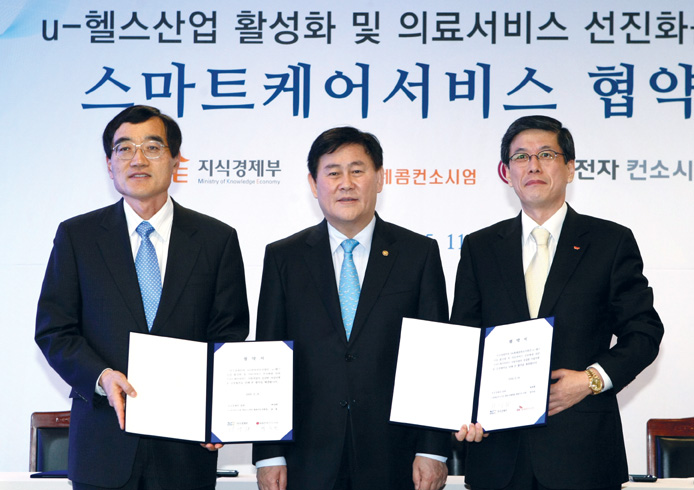U-Health Services, ¡®Blue Ocean¡¯
MKE announces strategies to foster the u-Health service industry as a future convergence industry

The Ministry of Knowledge Economy (MKE) has announced an ambitious package of strategies to nurture the ubiquitous-heath (u-Health) service industry as one of the promising future representative convergence industries with the goal of creating quality jobs and cutting down on medical costs for the general public.
Firing the first salvo for the full-fledged launch of the U-health strategies, the MKE signed a deal on a pilot program to prove the so-called smart care service with two consortiums, each headed by SK Telecom and LG Electronics.
Among those on hand at a ceremony to sign a deal on the pilot smart care program at the Central Post Office in downtown Seoul on May 11 were Minister of Knowledge Economy Choi Kyung-hwan; SK Telecom President Ha Sung-min; LG Electronics President Paik Woo-hyun; the representatives of the four local governments participating in the program ¡ª Daegu Vice Mayor Nam Dong-kyun, Chungcheongbuk-do Deputy Gov. Park Kyung-bae, Gyeonggi 1st Administration Deputy Gov. Ahn Yang-ho and Jeollanam-do Administration Deputy Gov. Lee Gae-ho; Suh Young-ju, chairman of Korea Evaluation Institute of Industrial Technology (KEIT); and Oh Kang-hyun, chairman of the Korea Petroleum Association (KPA). KEIT is responsible for managing the program and KPA has offered part of its social contribution fund. The u-Health service industry, a combination of IT, biotechnology and service industries, is predicted to maintain explosive job growth with an annual rate of more than 12 percent. If such potential factors as IT infrastructure, the public¡¯s tendency to embrace new technologies and the nation¡¯s high-standard of health services are capitalized on in reality, the u-Health industry is forecast to create about 39,000 quality jobs by 2014, Lee Dong-wook, director of the MKE¡¯s Emerging Industries Policy Division said. A report released by the Korea Health Industry Development Institute (KHIDI) last January showed that the value of the Korean u-health market will likely jump from 1.68 trillion won in 2010 to 3.03 trillion won in 2014 with an annual average growth rate of 12.5 percent. The KHIDI also predicted that the number of new jobs created by the industry will surge from 22,000 in 2010 to 39,000 in 2014.
The MKE¡¯s announcement of the u-Health strategies and the launch of the smart care service project are expected not only to provide momentum for the IT industry to make a leap forward, but also for the medical industry to create a new market through the verifying of the safety and reliability of telemedicine, Kang Myung-su, director of the MKE¡¯s Biotech & Nanotech Division, said.
Currently, the domestic u-Health industry has so far developed some equipment and communications services, but it lacks momentum, as related projects cannot be pushed ahead due to conflicting laws and systems. For instance, telemedicine between doctors and patients is banned in accordance with Article 34 of the Medical Act.
A shortage of successful business models, public insurance-oriented market restrictions and a lack of infrastructure in standardization/certification, manpower and statistics and other areas pose a hindrance to full-fledged proliferation of the u-Health industry and the promotion of exports.
The MKE decided to classify u-Health services into three categories ¡ª the u-Medical field for focusing on the treatment of patients with chronic diseases, the u-Silver field for nursing the elderly, and the u-Wellness category for improving and managing the health of the general public ¡ª and are implementing strategies tailored to meet each category¡¯s characteristics.
One of the major tasks to be carried out in the u-Medical category is the revamping of related laws and systems. The ministry plans to implement strategies to expand the market by ensuring institutional reform and creating new markets through the successful implementation of the pilot program on smart care. In the case of the u-Silver category, the ministry plans to implement demand-connected development strategies by developing products beloved by the elderly and stepping up experience networks.
In the u-Wellness category, where related laws do not stipulate restrictions unlike the u-Medical sector, the government will focus on boosting private investments by presenting successful business models to diverse business proprietors. Departing from the conventional way in which patients suffering from chronic ailments including diabetes and high blood pressure visit hospitals to undergo diagnosis, receive medical treatment and prescriptions, the smart care service project calls for building a new concept of providing telemedicine and health care via IT technologies.
In this regard, two consortiums, led by SK Telecom and LG Electronics, were selected as winners of the smart care service project that will cover 12,000 patients with chronic ailments and cost 52.1 billion won. On top of the two companies, four local governments, such large-size general hospitals as Seoul National University Hospital, Severance Hospital, Asan Medical Center and Samsung Hospital and 100 privately run clinics are participating in the pilot project. The ministry expects the smart care project to create models for managing patients with chronic ailments through primary medical institutions and invigorate the regional medical industry by exploring new profitable business portfolios.
Kim Joon-dong, director general for emerging industries at the MKE, said, ¡°The Act on the Promotion of Industry Convergence will be formulated and strategies to boost industry convergence will be established to preempt a delay in an entry into markets by the so-called diabetes phone and telemedicine sectors in which technologies and products are in place, yet there are no standards and too many restrictions.¡±nw
MKE Minister Choi Kyung-hwan is flanked by LG Electronics President Paik woo-hyun, left, and SKT President Ha Sung-min after they signed a deal on a pilot smart care program in Seoul on May 11.
3Fl, 292-47, Shindang 6-dong, Chung-gu, Seoul, Korea 100-456
Tel : 82-2-2235-6114 / Fax : 82-2-2235-0799